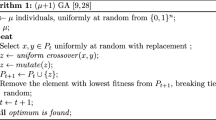Abstract
This article investigates various local operators in a discrete (1, λ)-setting applied to tracking problems, a specific class of non-stationary problems. In the first instance, the influence of operator properties on the tracking performance is examined. Both the enforcement of bigger steps and, especially, directed mutations are found to increase the tracking accuracy considerably. For the examination of highly time restricted problems, a correlation between the population size and the severity of the problem dynamics is assumed. Relatively large population sizes are found to be advantageous if the number of evaluations has a big influence on the severity. All results are obtained using a fixpoint analysis of a worst-case model as well as simulations within a two-dimensional Markov model.














Similar content being viewed by others
References
Angeline PJ (1997) Tracking extrema in dynamic environments. In: Angeline PJ, Reynolds RG, McDonnell JR, Eberhart R (eds) Evolutionary programming VI. Lecture notes in computer science, vol 1213. Springer, Berlin Heidelberg New York, pp 335–345
Arnold DV, Beyer H-G (2002) Random dynamics optimum tracking with evolution strategies. In: Guervós JJM, Adamidis P, Beyer H-G, Fernández-Villacañas J-L, Schwefel H-P (eds) Parallel problem solving from nature—PPSN VII. Lecture notes in computer science, vol 2439. Springer, Berlin Heidelberg New York, pp 3–12
Bäck T (1996) Evolutionary algorithms in theory and practice. Oxford University Press, New York
Bäck T (1997) Self-adaptation. In: Bäck T, Fogel DB, Michalewicz Z (eds) Handbook of evolutionary computation, vol C7.1. Institute of Physics Publishing and Oxford University Press, Bristol, pp 1–15
Bäck T (1998) On the behavior of evolutionary algorithms in dynamic environments. In: Proceedings of the IEEE international conference on evolutionary computation. IEEE Press, Piscataway, pp 446–451
Bäck T (1998) An overview of parameter control methods by self-adaptation in evolutionary algorithms. Fundamenta Informaticae 35:51–66
Bäck T (1999) Self-adaptive genetic algorithms for dynamic environments with slow dynamics. In: Wu A (ed) GECCO Workshops, pp 142–145
Beyer H-G (2001) The theory of evolution strategies. Springer, Berlin Heidelberg New York
Droste S (2002) Analysis of the (1+1) EA for a dynamically changing onemax-variant. In: Congress on Evolutionary Computation (CEC 2002). IEEE Press, Piscataway, pp 55–60
Eiben ÁE, Hinterding R, Michalewicz Z (1999) Parameter control in evolutionary algorithms. IEEE Trans Evol Comput 3(2):124–141
Ghozeil A, Fogel DB (1996) A preliminary investigation into directed mutations in evolutionary algorithms. In: Voigt H, Ebeling W, Rechenberg I (eds) Parallel problem solving from nature—PPSN IV. Lecture notes in computer science, vol 1141. Springer, Berlin Heidelberg New York, pp 329–335
Goldberg DE, Smith RE (1987) Nonstationary function optimization using genetic algorithms with dominance and diploidy. In: Grefenstette JJ (ed) Proceedings of the 2nd international conference on genetic algorithms. Lawrence Erlbaum Associates, Hillsdale, pp 59–68
Grefenstette JJ (1999) Evolvability in dynamic fitness landscapes: a genetic algorithm approach. In: Proceedings of the 1999 congress on evolutionary computation. IEEE Service Center, Piscataway, pp 2031–2038
Hildebrand L, Reusch B, Fathi M (1999) Directed mutation—a new selfadaptation for evolutionary strategies. In: Proceedings of the 1999 congress on evolutionary computation. IEEE Service Center, Piscataway, pp 1550–1557
Rudolph G (1997) Convergence properties of evolutionary algorithms. Kovač, Hamburg
Saleem S, Reynolds R (2000) Cultural algorithms in dynamic environments. In: Proceedings of the 2000 congress on evolutionary computation. IEEE Service Center, Piscataway, pp 1513–1520
Salomon R, Eggenberger P (1997) Adaptation on the evolutionary time scale: a working hypothesis and basic experiments. In: Hao J-K, Lutton E, Ronald E, Schoenauer M, Snyders D (eds) Artificial evolution: 3rd European conference AE’97. Lecture notes in computer science, vol 1363. Springer, Berlin Heidelberg New York, pp 251–262
Schwefel H-P (1977) Numerische Optimierung von Computer-Modellen mittels der Evolutionsstrategie (German). In: Interdisciplinary systems research, vol 26. Birkhäuser, Basel
Schwefel H-P (1995) Evolution and optimum seeking. Wiley, New York
Ursem RK (2000) Multinational GAs: multimodal optimization techniques in dynamic environments. In: Whitley D, Goldberg D, Cantu-Paz E, Spector L, Parmee I, Beyer H-G (eds) Proceedings of the genetic and evolutionary computation conference (GECCO-00). Morgan Kaufmann, San Francisco, pp 19–26
Vavak F, Fogarty TC, Jukes K (1996a) A genetic algorithm with variable range of local search for adaptive control of the dynamic systems. In: Proceedings of the 2nd international Mendelian conference on genetic algorithms. PC-DIR Publishing, Brno, pp 181–186
Vavak F, Fogarty TC, Jukes K (1996b) A genetic algorithm with variable range of local search for tracking changing environments. In: Voigt H-M, Ebeling W, Rechenberg I, Schwefel H-P (eds) Parallel problem solving from nature—PPSN IV. Lecture notes in computer science, vol 1141. Springer, Berlin Heidelberg New York, pp 376–385
Vavak F, Jukes KA, Fogarty TC (1998) Performance of a genetic algorithm with variable local search range relative to frequency of the environmental changes. In: Koza JR, Banzhaf W, Chellapilla K, Deb K, Dorigo M, Fogel DB, Garzon MH, Goldberg DE, Iba H, Riolo R (eds) Proceedings of the 3rd international conference on genetic programming. Morgan Kaufmann, San Mateo, pp 602–608
Vavak F, Jukes K, Fogarty TC (1997) Adaptive combustion balancing in multiple burner boiler using a genetic algorithm with variable range of local search. In: Bäck T (ed) Proceedings of the 7th international conference on genetic algorithms. Morgan Kaufmann, San Mateo, pp 719–726
Weicker K (2001) Problem difficulty in real-valued dynamic problems. In: Reusch B (ed) Computational intelligence: theory and applications. Lecture notes in computer science, vol 2206. Springer, Berlin Heidelberg New York, pp 313–325
Weicker K (2003) Evolutionary algorithms and dynamic optimization problems. PhD Thesis, University of Stuttgart, Stuttgart
Weicker K, Weicker N (1999) On evolution strategy optimization in dynamic environments. In: Proceedings of the 1999 congress on evolutionary computation. IEEE Service Center, Piscataway, pp 2039–2046
Author information
Authors and Affiliations
Corresponding author
Rights and permissions
About this article
Cite this article
Weicker, K. Analysis of local operators applied to discrete tracking problems. Soft Comput 9, 778–792 (2005). https://doi.org/10.1007/s00500-004-0419-y
Published:
Issue Date:
DOI: https://doi.org/10.1007/s00500-004-0419-y




